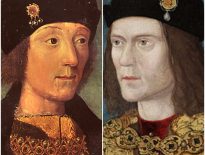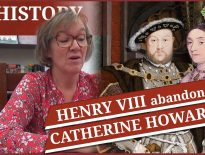On this day in Tudor history, Monday 7th November 1541, Thomas Cranmer, Archbishop of Canterbury, visited Catherine Howard, fifth wife of King Henry VIII, in her chambers at Hampton Court Palace.
Catherine had been confined to her chambers and Archbishop Cranmer's job was to get the now hysterical queen to talk, to confess. He visited her a few times over a period of 24 hours and finally got a confession from her. But what did Catherine have to say?
Find out all about Catherine Howard's confessions, and there were several, in today's talk.
Hear all about Catherine's end in my video from 13th February - https://youtu.be/4nGL47QKe4k
Book recommendations: "Young and Damned and Fair" by Gareth Russell; "The Remains of Thomas Cranmer, Archbishop of Canterbury", collected and arranged by Rev. Henry Jenkyns, Volume 1 available at https://archive.org/details/remainsthomascr01jenkgoog/page/n5
Also on this day in history:
- 1485 – Richard III and his supporters were attainted at Henry VII's first Parliament.
- 1557 – Death of Sir John Arundell of Lanherne. He was buried at St Mawgan Church. Arundell served Henry VIII as Sheriff of Cornwall and Commander of troops against the rebels during the Pilgrimage of Grace. He also served in France in 1544. During Edward VI's reign, in 1549, he was imprisoned after John, Baron Russell, accused him of refusing to raise troops and of ordering the mass to be performed. He was released in June 1552.
- 1565 – Death of Sir Edward Warner, soldier, member of Parliament and Lieutenant of the Tower of London during the reigns of Edward VI and Elizabeth I. He was the gaoler of Katherine Seymour (née Grey), Countess of Hertford, who had been imprisoned for secretly marrying Edward Seymour, Earl of Hertford. Warner died in Norfolk and was buried at Little Plumstead Church in the county.
- 1568 – Baptism of Dunstan Gale, poet and author of “Pyramus and Thisbe”, at St Giles Cripplegate, London.
- 1581 – Death of Richard Davies, scholar and Bishop of St David's, in Abergwili, Carmarthenshire, in the bishop's palace. He was a friend of Matthew Parker, Archbishop of Canterbury, and undertook translations of parts of the Bible.
- 1603 – Burial of Robert Allot, literary compiler, bookseller, poet and editor of the 1599 “Wits Theater” and the 1600 “Englands Parnassus”, at St Ann Blackfriars.



I think the Tudors caught this well with her being upset and distressed, much with lamenting alone with her maid, the Lady Rochford. She screamed wildly “Why are they doing this? What do they know?” Kathryn was very upset and there we see her panicking and the terror that she felt became clear when Thomas Cramner visited her and asked her to tell him everything.
Kathryn was in such a state that he had to return and now she played a great part. She was terrified, I don’t deny that but she was hiding something. Kathryn knew she had been rumbled but she tried to get the best out of things as she could and after being reassured of mercy she opened up. Kathryn technically had committed no crime and technically she didn’t lose anything by this confession, but it wasn’t as simple as that: she was Queen of England, wife to King Henry Viii: former lovers might become present lovers and put the succession in doubt.
Kathryn, however, was contradictory in her confession, even if she was detailed. She told the Archbishop, bit by bit about Mannox and Francis Dereham and how they had been lovers in her teens and how Dereham had come to her room and with her friends, they had been young and foolish, as most young people are, had midnight feasts and experimental sexual encounters. Kathryn was never meant to be Queen, so this might not have mattered and any other husband could have been told and brought off if necessary. But, Kathryn was Queen and this was a bit of a problem. Out of pride or fear, or not really thinking Kathryn had suppressed her past, hopefully it would never come to life. Now, a resentful Protestant had given the game away and Cramner had little choice but to tell the King. What was so shocking to Henry was that the entire affair was true and now he had to decide what to do with his wife and her revelations.
Kathryn made three confessions and one is missing but from her later ones it is clear that she told Cramner that her relationship with Francis Dereham was that of a lover and she had a good time with him. It was only later that she said he constrained her to his will, but much of the other evidence, both from her and her fellowship from being in the household of the Dowager Duchess of Norfolk contradicts that later statement. It was now that Cranmer ceased to believe her.
Kathryn was a young woman, caught in a nightmare of her own making, but genuinely worried and confused and abandoned. She was trying to save herself. I don’t believe Henry wanted to harm her at this point: he was himself devastated by these revelations. Kathryn had not committed adultery or treason and her faults at present were confined to her past, but he could set her aside in disgrace. I may sound harsh now, but I actually feel sorry for Henry, he was the one who had been made to look a fool, put all his hopes in a young woman from a noble family, expected to be a virgin and she had a lover.
Mannox one might say was grooming Kathryn and abused his position, but with Dereham, it was consensual. Dereham was a rake, he wasn’t the nicest person around and he was boasting that he had known Kathryn before her marriage and was rude and inappropriate around her and her ladies. He saw their former relationship as if she had been promised to him and things were about to get worse. In a more serious cross examination Dereham denounced Thomas Culpeper, the King’s body servant and well known to Kathryn as her present lover, which was why he didn’t currently have a relationship with the Queen. The bottom of the pot indeed.